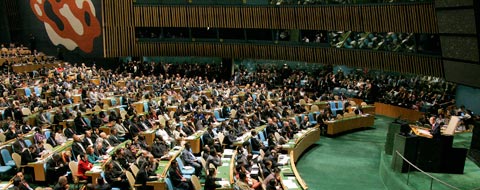Role of the General Assembly
The General Assembly plays a key role in the financing of peacekeeping. The sixty-eighth session opened on 17 September 2013.

UN Photo/Paulo Filgueiras
Secretary-General Ban Ki-moon addresses the opening of the general debate.
The General Assembly is the main deliberative, policymaking and representative organ of the United Nations. Comprising all 193 Member States of the UN, it provides a unique forum for multilateral discussion of international issues including peace and security.
Sixty-eighth session of the General Assembly
The sixty-eighth session opened on 17 September 2013. The annual general debate, where the world assembly hears statements by Heads of State and Ministers, begins on 24 September. This year's theme for the general debate is "Post-2015 Development Agenda: Setting the Stage."
Global contribution for global peace
At the start of the new session of General Assembly we are highlighting the difference that contributions from Member States - troops, police, equipment, training - make to the lives of the people we are serving in countries across the world.
View our global contribution page with interactive data and stories.
Financing matters
While not normally directly involved in political decisions on establishing or terminating UN Peacekeeping operations, the General Assembly does play a key role in peacekeeping financing.
As all UN Member States share the costs of peacekeeping, the Assembly apportions these expenses based on a special scale of assessments, taking into account the relative economic wealth of Member States, with the permanent members of the Security Council required to pay a larger share because of their special responsibility for the maintenance of international peace and security.
The General Assembly, through its Fifth Committee (Administrative and Budgetary) approves and oversees the peacekeeping budget. This includes how specific field operations are funded and equipped, based on detailed submissions provided to it by the UN Secretary-General.
Special Committee on Peacekeeping Operations
The General Assembly monitors the performance of UN Peacekeeping through its Special Committee on Peacekeeping Operations. It was established in 1965 to conduct a comprehensive review of all issues relating to peacekeeping. The Committee reports on its work to the General Assembly through its Fourth Committee (Special Political and Decolonization).
"Uniting for Peace" resolution
Under the UN Charter, however, the General Assembly cannot discuss and make recommendations on peace and security matters which are at that time being addressed by the Security Council.
Despite the UN Charter's provision limiting the General Assembly's powers with regard to peace and security matters, there may be cases when the Assembly can take action.
In accordance with the General Assembly's "Uniting for Peace" resolution of November 1950 [resolution 377 (V)] ![]() , if the Security Council fails to act, owing to the negative vote of a permanent member, then the General Assembly may act. This would happen in the case where there appears to be a threat to the peace, breach of the peace or act of aggression. The General Assembly can consider the matter with a view to making recommendations to Members for collective measures to maintain or restore international peace and security.
, if the Security Council fails to act, owing to the negative vote of a permanent member, then the General Assembly may act. This would happen in the case where there appears to be a threat to the peace, breach of the peace or act of aggression. The General Assembly can consider the matter with a view to making recommendations to Members for collective measures to maintain or restore international peace and security.
This resolution was invoked only once in UN peacekeeping history, when in 1956 the General Assembly established the First UN Emergency Force (UNEF I) in the Middle East.
Related links
- Global contribution for global peace
- 2012: Member States contributing to peace
- The Charter of the United Nations
- Special Committee on Peacekeeping Operations
- Fourth Committee of the General Assembly
- Fifth Committee of the General Assembly
- 2010 General Assembly thematic debate on peacekeeping
- More on UN General Assembly
